My wish is that the next President of the United States would require every Congressperson and every member of his or her cabinet to spend a week touring our nation’s capital. They would be required to read every quotation at the memorials and monuments to George Washington, Thomas Jefferson, and  Abraham Lincoln. They would need to walk through the Vietnam Memorial and speak to the veterans they see. Some hours in the Holocaust Memorial Museum would be another requirement, along with a trip to Mount Vernon and Arlington Cemetery. In the course of their first term in office each senator or representative would make it a point to visit each building of the Smithsonian. Having completed this tour, everyone would be imbued with the principles of democracy and the inspiration that has inspired the world. Our leaders would realize Thomas Jefferson’s words: “In matters of principle stand like a rock,” and they would know “action will delineate and define you” (quotations from the Thomas Jefferson Memorial).
Abraham Lincoln. They would need to walk through the Vietnam Memorial and speak to the veterans they see. Some hours in the Holocaust Memorial Museum would be another requirement, along with a trip to Mount Vernon and Arlington Cemetery. In the course of their first term in office each senator or representative would make it a point to visit each building of the Smithsonian. Having completed this tour, everyone would be imbued with the principles of democracy and the inspiration that has inspired the world. Our leaders would realize Thomas Jefferson’s words: “In matters of principle stand like a rock,” and they would know “action will delineate and define you” (quotations from the Thomas Jefferson Memorial).
Walking up the stairs to the Lincoln Memorial, I felt that I was approaching moral greatness in a man who claimed “I never had a policy; I have just tried to do my best each and every day.” That daily best included not punishing the South after the Civil War. That daily best included integrity in his use of authority, practicing what he preached: “Nearly all men can stand adversity, but if you want to test a 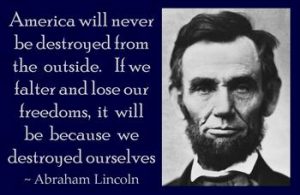 man’s character, give him power.” Our newspapers contain articles about poverty, racism, infant mortality, and poor education. We need the will to ensure every American has enough to eat, a place to stay, and an opportunity to become their best selves. Otherwise we face the risk that Lincoln spoke of: “America will never be destroyed from the outside. If we falter and lose our freedom, it will be because we destroyed ourselves.”
man’s character, give him power.” Our newspapers contain articles about poverty, racism, infant mortality, and poor education. We need the will to ensure every American has enough to eat, a place to stay, and an opportunity to become their best selves. Otherwise we face the risk that Lincoln spoke of: “America will never be destroyed from the outside. If we falter and lose our freedom, it will be because we destroyed ourselves.”
[Sister Valerie recently returned from a five-day trip to Washington, D.C. Over the next few days you will read of her impressions.]
I recently had perfect weather in D.C., something which, I understand, is rather unusual. The cherry blossoms bunched in brown piles along the curbs, but tulips and flowering trees made the walks from hotel to monuments and museums pleasantly colorful. On one day the sky was solid blue—not a cloud—letting the Washington Monument stand out in all its white glory. The picture was serene, matching George Washington’s desire for peace. Even though he led the Revolutionary War, he wrote “Cultivate peace and harmony with all” and “My first wish is to see. . . war banished from the earth.”
had perfect weather in D.C., something which, I understand, is rather unusual. The cherry blossoms bunched in brown piles along the curbs, but tulips and flowering trees made the walks from hotel to monuments and museums pleasantly colorful. On one day the sky was solid blue—not a cloud—letting the Washington Monument stand out in all its white glory. The picture was serene, matching George Washington’s desire for peace. Even though he led the Revolutionary War, he wrote “Cultivate peace and harmony with all” and “My first wish is to see. . . war banished from the earth.”
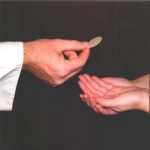 This morning at the Mass at which the elementary school was present the kindergarten teacher received her “Second Holy Communion.” She had been received into the Church five days before at the Easter Vigil. From my vantage point on the piano bench I noticed her approach to receive the Body of Christ. Unlike past school liturgies she did not come with arms crossed over her chest. Instead she came with a shy, expectant but humble smile. One could almost sense the eagerness. Then as she went toward the cup to receive the Precious Blood, her broad smile suggested a giggle of joy. The sight brought tears to my eyes and a humbling thought: “I have received Eucharist hundreds of times. When was the last time that I almost giggled with delight?”
This morning at the Mass at which the elementary school was present the kindergarten teacher received her “Second Holy Communion.” She had been received into the Church five days before at the Easter Vigil. From my vantage point on the piano bench I noticed her approach to receive the Body of Christ. Unlike past school liturgies she did not come with arms crossed over her chest. Instead she came with a shy, expectant but humble smile. One could almost sense the eagerness. Then as she went toward the cup to receive the Precious Blood, her broad smile suggested a giggle of joy. The sight brought tears to my eyes and a humbling thought: “I have received Eucharist hundreds of times. When was the last time that I almost giggled with delight?”
 When I awoke, I looked at the clock. 3:16. With a sleepy smile at the reminder that “God so loved the world that he gave his only Son” I went back to sleep, still exhausted from the rigors of a liturgist during Holy Week. Now in the morning when my mind focuses on the Son’s giving up his glorious existence to experience everything we experience—suffering and death, friendship and love–I look at a question more important than “Why does God allow suffering?” I should ask “Why does God enter into our suffering?”
When I awoke, I looked at the clock. 3:16. With a sleepy smile at the reminder that “God so loved the world that he gave his only Son” I went back to sleep, still exhausted from the rigors of a liturgist during Holy Week. Now in the morning when my mind focuses on the Son’s giving up his glorious existence to experience everything we experience—suffering and death, friendship and love–I look at a question more important than “Why does God allow suffering?” I should ask “Why does God enter into our suffering?”
God and suffering meet on the cross, where Jesus let omnipotence drain from him and took to himself “omni-suffering.” According to Walter Kasper, the “very goal of the incarnation” was the cross. Without the cross, we may have wondered, “Did God really become fully, completely, truly human?” The cross leaves no doubt. Kasper continues, “God would not have become truly a human being had he not entered fully into the abyss and night of death.” Because of the cross “whoever believes in him may not die but may have eternal life” (John 3:16).
“I formed you, and set you as a covenant of the people, a light for the nations, to open the eyes of the blind, to bring out prisoners from confinement, and from the dungeon, those who live in darkness.” (Isaiah 42:6b-7)
Imagine God reading Isaiah 42:1-7 to you to remind you that you were formed to be a light for the nations. A tall order, but you can do it, because the Lord is your light and salvation (psalm 27). God will shine through you, because God needs you. God needs your knowledge, skills, personality, talents to build up the earth. God plans through our thoughts and feelings to achieve the aim of creation: to bring all into one in love.
Sometimes we think God’s will is floating in cyberspace, and unfortunately there’s no app to know God’s will. But God wants us to be part of the plan. The plan (God’s will) is co-created through the exercise of our own hearts and minds. Actually God’s plan needs our own best thinking. When we’re prayerful people, God speaks to us in our own voice; in other words, God’s thoughts are our thoughts. This means that when we ask “Which way, God?” the answer is God’s ways are our ways. Wow! Although we can do nothing without God, God still works through us for the redemption of the world by our own activity. Cooperating with God is grace and blessing. God wants us to get involved, aim toward union with others, and help all creation come to its best fulfillment. Some call this “christifying” the world through our own actions or “going to heaven through earth.”
As we begin Holy Week, be open to God who speaks through your own person. Be like Martha who did what she did best for Jesus by preparing a meal. Be like Mary who did what she did best for Jesus by anointing Jesus’ feet. Be like Jesus who kept heading toward Jerusalem.
How does God shine through you best? How can you be a light to the nations?
How can you use the opportunities of this Holy Week to “christify” the world?
Loving God, I give you my hands, heart, and voice today to aid you in your plan to bring about a world united in love. Give strength to my hands to serve, give your Spirit to my heart to love, and give courage to my voice to speak your words of truth. I ask this through your Son, our Lord Jesus Christ, who allowed someone to wash his feet as a sign of comforting encouragement as he set out for his death in Jerusalem.
The Solemnity of St. Joseph falls the day before Palm Sunday this year. The juxtaposition of St. Joseph whom we know only in the context of Jesus’ childhood with the passion and death of Jesus 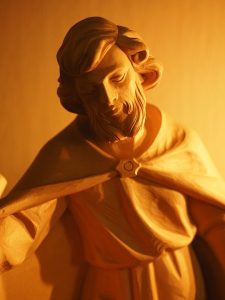 makes me wonder what role Joseph may have played during the passion of Jesus? Did memories of Joseph cross Jesus’ mind on the way to Calvary? Perhaps Joseph’s strength gave Jesus strength. Perhaps Joseph’s obedience to an angel helped Jesus learn obedience through what he suffered. Palms waving—a glimpse of Joseph’s play? Rough wood of the cross—Joseph’s calloused, splintered, bleeding hands? Twenty pieces of silver—Joseph’s integrity knowing the real worth of the Child in his care. The compassion of Jesus toward the weeping women of Jerusalem—Joseph’s compassion toward Mary? Jesus’ silence during trial—Joseph’s silence? Peter’s betrayal—Joseph’s words to his little boy when Jesus heartbroken by a friend’s words came from school or synagogue to hear Joseph’s wise advice? Dying with words of forgiveness on his lips—the words of Joseph as he approached death? Jesus’ trust in Abba first learned in a boy’s trust in his foster father? The Joseph who trudged to Bethlehem and who anxiously made his way to Egypt certainly was with Jesus every step of the way to Calvary.
makes me wonder what role Joseph may have played during the passion of Jesus? Did memories of Joseph cross Jesus’ mind on the way to Calvary? Perhaps Joseph’s strength gave Jesus strength. Perhaps Joseph’s obedience to an angel helped Jesus learn obedience through what he suffered. Palms waving—a glimpse of Joseph’s play? Rough wood of the cross—Joseph’s calloused, splintered, bleeding hands? Twenty pieces of silver—Joseph’s integrity knowing the real worth of the Child in his care. The compassion of Jesus toward the weeping women of Jerusalem—Joseph’s compassion toward Mary? Jesus’ silence during trial—Joseph’s silence? Peter’s betrayal—Joseph’s words to his little boy when Jesus heartbroken by a friend’s words came from school or synagogue to hear Joseph’s wise advice? Dying with words of forgiveness on his lips—the words of Joseph as he approached death? Jesus’ trust in Abba first learned in a boy’s trust in his foster father? The Joseph who trudged to Bethlehem and who anxiously made his way to Egypt certainly was with Jesus every step of the way to Calvary.
 Walking outside during a recent wet snow somehow had me reflecting on the parable of the Sower and the Seed in the context of a March snowfall in Ohio. It went something like this:
Walking outside during a recent wet snow somehow had me reflecting on the parable of the Sower and the Seed in the context of a March snowfall in Ohio. It went something like this:
Once there was a sky full of snow clouds from which small snowflakes fell lightly. Some fell on the lake. Others fell on the sidewalk and driveways. Still others fell on the grass. Those tiny flakes, though infinitesimal in weight, formed tiny rings on the water. Those that fell on the sidewalks and driveways immediately melted. Those that fell on the grass stayed there and eventually mounted into two-inch piles of white fluff. So what were the snowflakes saying to me? My ruminations equated snowflakes with Lenten practices: prayer, fasting, good deeds. The Lenten practices forming circles on the water represent the impact of the “little things” done for God and God’s People. Nothing is too lightweight. Good reaches out in wider diameters of good. Lenten practices falling on concrete and asphalt are transformed from solid into liquid. In that, these Lenten practices represent a change in us. A sacrifice here or an hour of service there changes us: we are a little kinder, a little more generous. We may even change the state of another from destitution to subsistence, for example. Finally the Lenten deeds falling on grass represent the cumulative effect of the whole Church, the Body of Christ. Millions of good deeds unite in a pure white offering.
Well, parables don’t have exact one-to-one correspondence, so what would you make of this parable?
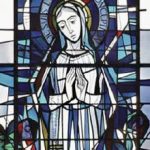 An unknown author wrote “Without faith, we are as stained glass windows in the dark.” A priest wanted to show the stained glass windows depicting the nativity of Jesus at all the Christmas Masses, but nearly every Mass was celebrated in darkness. He created an elaborate plan for a huge spotlight strung outside to illuminate the window. It worked. Without light a stained glass window is just a black space in the wall without meaning. Without faith our lives are dark places without meaning. Let today be colored brilliantly by your faith.
An unknown author wrote “Without faith, we are as stained glass windows in the dark.” A priest wanted to show the stained glass windows depicting the nativity of Jesus at all the Christmas Masses, but nearly every Mass was celebrated in darkness. He created an elaborate plan for a huge spotlight strung outside to illuminate the window. It worked. Without light a stained glass window is just a black space in the wall without meaning. Without faith our lives are dark places without meaning. Let today be colored brilliantly by your faith.
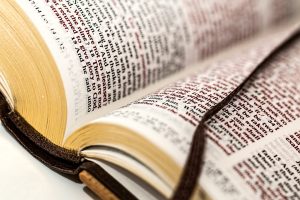 Someone said, “The more I read my Bible, the more I see myself within its pages.” I wonder which pages. Wouldn’t that make a day of reflection—finding yourself on one page of the Bible? Where would we begin to look? The Psalms that encompass almost every human emotion? The Gospels wherein the words and actions of Jesus Christ are the model for our lives? Is there a story in which I could insert my name?
Someone said, “The more I read my Bible, the more I see myself within its pages.” I wonder which pages. Wouldn’t that make a day of reflection—finding yourself on one page of the Bible? Where would we begin to look? The Psalms that encompass almost every human emotion? The Gospels wherein the words and actions of Jesus Christ are the model for our lives? Is there a story in which I could insert my name?

